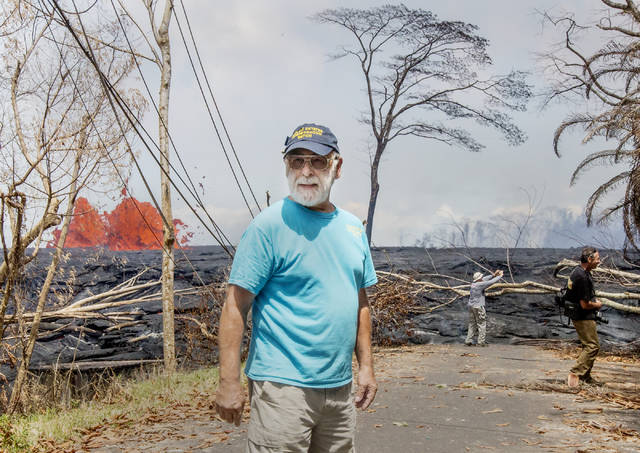Leilani Estates residents have had a front-row seat to the Kilauea eruption that has destroyed hundreds of homes and upended their community.
Now some say they want a seat at the table with those making decisions that affect their lives.
Andy Andrews of Leilani said 126 residents signed a letter that was delivered to the county Wednesday seeking more transparency in decisions affecting their neighborhood. It also asks that someone selected by residents be allowed to attend government meetings where such decisions are made.
“We mostly presented it in the spirit of cooperation,” he said. “Although we were pretty emphatic it’s not something on our wish list. We kind of have an expectation of the need for transparency in government.”
Andrews said they understand and appreciate efforts to keep out people who shouldn’t be in the neighborhood following evacuations. But there are concerns decisions about access to the neighborhood, where the eruption started May 3, are made without consulting with residents or informing them.
For instance, he said he was surprised to find out at a community meeting a few weeks ago that residents could be cited or arrested for being in parts of the voluntary evacuation area away from their home.
“Part of our concern, too, is that things don’t show up in writing,” Andrews said.
He said the county did respond to complaints about the initial curfew hours and made changes.
The eruption has been paused for nearly two weeks, and it remains unclear if the fissures will reactivate. A mandatory evacuation area remains in place from Pomaikai Street to the east.
Talmadge Magno, county Civil Defense administrator, said he attends meetings with community groups, and was meeting with Leilani residents Thursday to talk about what needs to happen to restore the subdivision if lava doesn’t return.
“That’s definitely something we’ve been doing,” he said.
But Magno said it might be too difficult to accommodate the request to invite residents or neighborhood representatives to agency meetings.
“To include all of the parties involved in these presentations, meetings would just be too cumbersome,” he said. “It would defeat the purpose of getting things to the point where it’s streamlined.”
No decisions have been made yet about loosening restrictions in the neighborhood, including access to homes that remain within the mandatory evacuation area. Residents can access only under escort.
As for restrictions on residents moving around the neighborhood, Magno said that was put in place early on to deal with people who were using placards to access the subdivision and burglarize homes. He said he wasn’t aware of a resident being arrested or cited because of that.
“I know there are situations where friends are visiting neighbors,” Magno said. “It’s up to the police officer to make that distinction.”
With the mandatory evacuation area still in place, Leilani resident Cheryl Carroll said they can’t access the Leilani Estates Community Center, forcing residents to host meetings outside the subdivision.
She echoed Andrews’ concern, stating, “They’re trying to decide what’s best for us without consulting us or asking us what we need.”
Jay Turkovsky, president of the Leilani Estates Community Association, said the measures were making living in the subdivision harder than necessary.
“It’s like trying to keep road fatalities at zero by setting the speed limit at zero,” he said.
Magno said he understands residents’ frustration, but he re-emphasized that the volcanic threat is not over, despite the apparent pause in lower Puna lava activity.
“There’s no definite end in sight,” Magno said. “We can’t open up the subdivision until we’re sure it’s done.”
Magno said Civil Defense revisits its Leilani policies every day to determine if they are still valid and necessary as the state of the subdivision changes. If a policy is determined to have no more utility, then it will be abolished.
Email Tom Callis at tcallis@hawaiitribune-herald.com.
Email Michael Brestovansky at mbrestovansky@hawaiitribune-herald.com.




